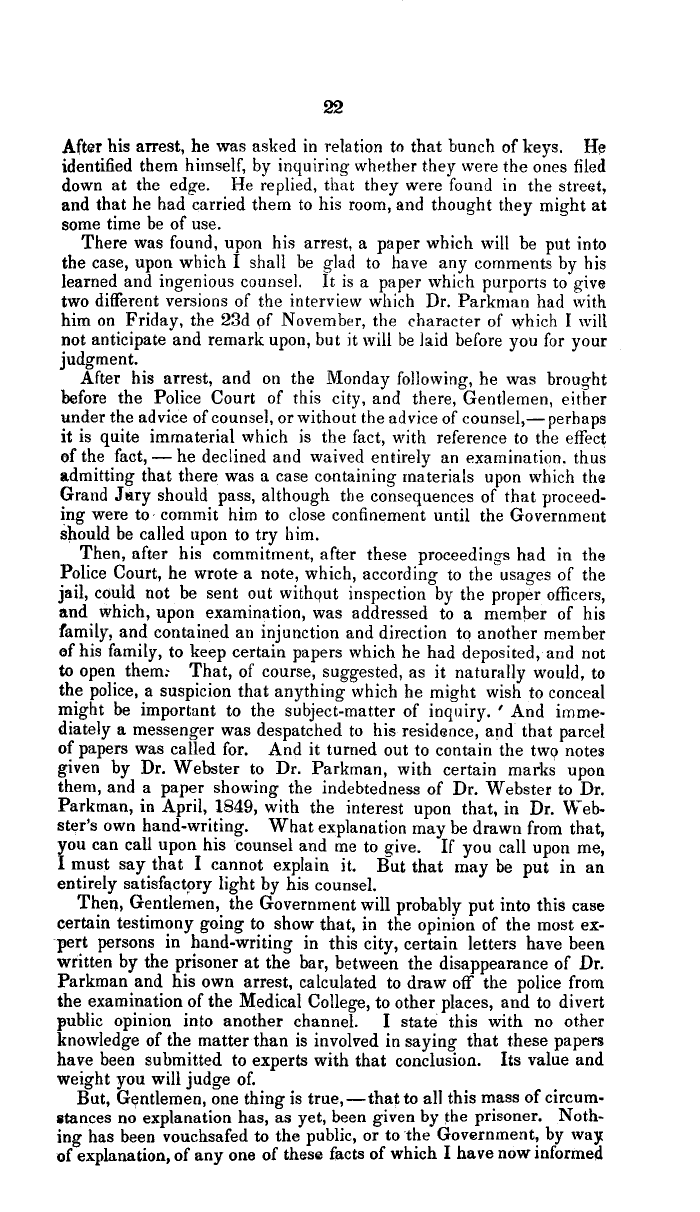|
22
After his arrest, he was asked in relation to that bunch of keys. He
identified them himself, by inquiring whether they were the ones filed
down at the edge. He replied, that they were found in the street,
and that he had carried them to his room, and thought they might at
some time be of use.
There was found, upon his arrest, a paper which will be put into
the case, upon which I shall be glad to have any comments by his
learned and ingenious counsel. It is a paper which purports to give
two different versions of the interview which Dr. Parkman had with
him on Friday, the 23d of November, the character of which I will
not anticipate and remark upon, but it will be laid before you for your
judgment.
After his arrest, and on the Monday following, he was brought
before the Police Court of this city, and there, Gentlemen, either
under the advice of counsel, or without the advice of counsel,-perhaps
it is quite immaterial which is the fact, with reference to the effect
of the fact,-he declined and waived entirely an examination. thus
admitting that there was a case containing materials upon which the
Grand Jary should pass, although the consequences of that proceed-
ing were to- commit him to close confinement until the Government
should be called upon to try him.
Then, after his commitment, after these proceedings had in the
Police Court, he wrote a note, which, according to the usages of the
jail, could not be sent out without inspection by the proper officers,
and which, upon examination, was addressed to a member of his
family, and contained an injunction and direction to another member
of his family, to keep certain papers which he had deposited, and not
to open them: That, of course, suggested, as it naturally would, to
the police, a suspicion that anything which he might wish to conceal
might be important to the subject-matter of inquiry. ' And imme-
diately a messenger was despatched to his residence, and that parcel
of papers was called for. And it turned out to contain the two notes
given by Dr. Webster to Dr. Parkman, with certain marks upon
them, and a paper showing the indebtedness of Dr. Webster to Dr.
Parkman, in April, 1549, with the interest upon that, in Dr. W eb-
ster's own hand-writing. What explanation may be drawn from that,
you can call upon his counsel and me to give. If you call upon me,
I must say that I cannot explain it. But that may be put in an
entirely satisfactory light by his counsel.
Then, Gentlemen, the Government will probably put into this case
certain testimony going to show that, in the opinion of the most ex-
pert persons in hand-writing in this city, certain letters have been
written by the prisoner at the bar, between the disappearance of Dr.
Parkman and his own arrest, calculated to draw off the police from
the examination of the Medical College, to other places, and to divert
public opinion into another channel. I state this with no other
knowledge of the matter than is involved in saying that these papers
have been submitted to experts with that conclusion. Its value and
weight you will judge of.
But, Gentlemen, one thing is true,-that to all this mass of circum-
stances no explanation has, as yet, been given by the prisoner. Noth-
ing has been vouchsafed to the public, or to the Government, by way
of explanation, of any one of these facts of which I have now informed
|

